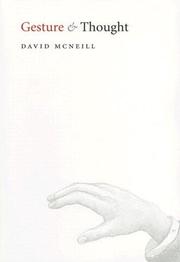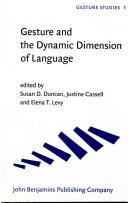| Listing 1 - 4 of 4 |
Sort by
|
Multi
ISBN: 9781107605497 9781107021211 1107021219 1107605490 9781139108669 9781139549752 1139549758 1316089827 1139564544 1283610868 1139551000 9786613923318 1139108662 1139555960 1139554719 1139552252 Year: 2012 Publisher: Cambridge Cambridge University Press
Abstract | Keywords | Export | Availability | Bookmark
 Loading...
Loading...Choose an application
- Reference Manager
- EndNote
- RefWorks (Direct export to RefWorks)
Human language is not the same as human speech. We use gestures and signs to communicate alongside, or instead of, speaking. Yet gestures and speech are processed in the same areas of the human brain, and the study of how both have evolved is central to research on the origins of human communication. Written by one of the pioneers of the field, this is the first book to explain how speech and gesture evolved together into a system that all humans possess. Nearly all theorizing about the origins of language either ignores gesture, views it as an add-on or supposes that language began in gesture and was later replaced by speech. David McNeill challenges the popular 'gesture-first' theory that language first emerged in a gesture-only form and proposes a groundbreaking theory of the evolution of language which explains how speech and gesture became unified.
Linguistics --- Semiotics --- Language and languages --- Speech and gesture. --- Langage et langues --- Parole et gestes --- Origin. --- Origines --- Speech and gesture --- Origin --- Linguistic change. --- Gesture and language --- Gesture and speech --- Language and gesture --- Gesture --- Origin of languages --- Speech --- Arts and Humanities --- Language & Linguistics --- Language and languages - Origin

ISBN: 0226514633 9780226514635 0226514625 9780226514628 9786611965945 1281965944 0226514641 9780226514642 9781281965943 Year: 2005 Publisher: Chicago : University of Chicago Press,
Abstract | Keywords | Export | Availability | Bookmark
 Loading...
Loading...Choose an application
- Reference Manager
- EndNote
- RefWorks (Direct export to RefWorks)
Gesturing is such an integral yet unconscious part of communication that we are mostly oblivious to it. But if you observe anyone in conversation, you are likely to see his or her fingers, hands, and arms in some form of spontaneous motion. Why? David McNeill, a pioneer in the ongoing study of the relationship between gesture and language, set about answering this question over twenty-five years ago. In Gesture and Thought he brings together years of this research, arguing that gesturing, an act which has been popularly understood as an accessory to speech, is actually a dialectical component of language. Gesture and Thought expands on McNeill's acclaimed classic Hand and Mind. While that earlier work demonstrated what gestures reveal about thought, here gestures are shown to be active participants in both speaking and thinking. Expanding on an approach introduced by Lev Vygotsky in the 1930's, McNeill posits that gestures are key ingredients in an "imagery-language dialectic" that fuels both speech and thought. Gestures are both the "imagery" and components of "language." The smallest element of this dialectic is the "growth point," a snapshot of an utterance at its beginning psychological stage. Utilizing several innovative experiments he created and administered with subjects spanning several different age, gender, and language groups, McNeill shows how growth points organize themselves into utterances and extend to discourse at the moment of speaking. An ambitious project in the ongoing study of the relationship of human communication and thought, Gesture and Thought is a work of such consequence that it will influence all subsequent theory on the subject.
Psycholinguistics --- Semiotics --- Gesture --- Language and languages --- Sign language --- Speech --- Thought and thinking --- #KVHA:Cognitieve linguïstiek --- #KVHA:Lichaamstaal --- #KVHA:Psycholinguïstiek --- #KVHA:Taalkunde --- Mind --- Thinking --- Thoughts --- Educational psychology --- Philosophy --- Psychology --- Intellect --- Logic --- Perception --- Self --- Talking --- Oral communication --- Phonetics --- Voice --- Deaf --- Gesture language --- Signs and symbols --- Language, Psychology of --- Psychology of language --- Linguistics --- Foreign languages --- Languages --- Anthropology --- Communication --- Ethnology --- Information theory --- Meaning (Psychology) --- Philology --- Mudra --- Acting --- Body language --- Elocution --- Movement (Acting) --- Oratory --- Psychological aspects --- Gesture. --- Psycholinguistics. --- Thought and thinking. --- Speech. --- Sign language. --- Language and languages. --- Psycholinguistique --- gesturing, communication, conversation, linguistics, speech, language, lev vygotsky, thought, cognition, imagery, psycholinguistics, thinking, sign, age, gender, utterances, discourse, cognitive psychology, anthropology, kinetic, expression, embodiment, consciousness, dialectic, neurology, social context, function, mind and body, nonfiction. --- Cognition et langage --- Gestes
Book
ISBN: 1780783108 9781780783109 1842278118 9781842278116 9781842278116 Year: 2013 Publisher: Milton Keynes, England : Paternoster,
Abstract | Keywords | Export | Availability | Bookmark
 Loading...
Loading...Choose an application
- Reference Manager
- EndNote
- RefWorks (Direct export to RefWorks)
Christian philosophy. --- Philosophy, Christian --- Philosophy

ISBN: 1282154621 9786612154621 9027292507 9789027292506 9027228418 9789027228413 9789027228413 Year: 2007 Publisher: Philadelphia : J. Benjamins Pub. Co.,
Abstract | Keywords | Export | Availability | Bookmark
 Loading...
Loading...Choose an application
- Reference Manager
- EndNote
- RefWorks (Direct export to RefWorks)
Each of the 21 chapters in this volume reflects a view of language as a dynamic phenomenon with emergent structure, and in each, gesture is approached as part of language, not an adjunct to it. In this, all of the authors have been influenced by David McNeill's methods for studying natural discourse and by his theory of the human capacity for language. The introductory chapter by Adam Kendon contextualizes McNeill's research paradigm within a history of earlier gesture studies. Chapters in the first section, Language and Cognition, emphasize what McNeill refers to as the intrapersonal plane. Many of the chapters adduce evidence for McNeill's claim that gestures can serve as a window onto the speaker's mind. Chapters in the second section, Environmental Context and Sociality, emphasize the interpersonal plane and exemplify McNeill's focus on how moment-to-moment language use is determined by contextual factors. The final section of the volume, Atypical Minds and Bodies, concerns lessons to be learned from studies of aphasic patients, autistic children, and artificial humans.
Gesture. --- Body language. --- Kinesics --- Nonverbal communication (Psychology) --- Interpersonal communication --- Nonverbal communication --- Mudra --- Acting --- Body language --- Elocution --- Movement (Acting) --- Oratory --- Sign language
| Listing 1 - 4 of 4 |
Sort by
|

 Search
Search Feedback
Feedback About UniCat
About UniCat  Help
Help News
News